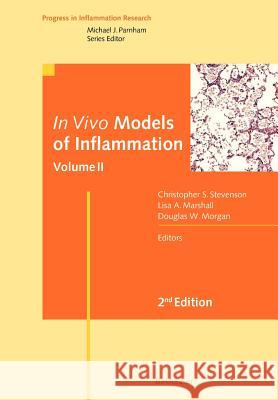In Vivo Models of Inflammation: Volume 2 » książka
In Vivo Models of Inflammation: Volume 2
ISBN-13: 9783764377571 / Angielski / Twarda / 2006 / 220 str.
In Vivo Models of Inflammation (Volume 1 and Volume 2) provides the biomedical researcher in both the pharmaceutical industry and academia with a description of the state of the art animal model systems used to emulate diseases with components of inflammation. This second edition acts as a complement to the first edition by describing and updating the standard models that are most utilized for specific disease areas. In addition, new models are included exploring emerging areas of inflammation research. The format is designed with the laboratory in mind: Both volumes provide detailed descriptions of the methodologies and uses of the most significant models. This includes current information regarding agents that demonstrate efficacy, those that do not and those that can be used as standard controls. The focus remains on those models that serve as pre-clinical correlates to human disease as well as those that represent components of the inflammatory response. Pioneering ideas and provocative comments about future directions are meant to challenge the status quo and stimulate new thinking. Therefore, new approaches to the development of future models in selected therapeutic areas have been highlighted. The focus on novel technologies that are vital for innovative in vivo research has been expanded to include chapters on the use of transgenic and gene transfer technologies, nanotechnology, and stem cells. This up-to-date reference manual helps to select the best animal model for a specific question. At the same time, this set of books continues to acknowledge the solemn responsibility in vivo research carries with it and extends the coverage of animal respect and welfare when used in experimental settings. Chapters describing current regulations in the United States, United Kingdom, and Japan address these concerns. Thus, the ultimate aim of this set of books is to provide current best practices for obtaining the maximum information from in vivo experimentation, while preserving the dignity and comfort of the animal.











